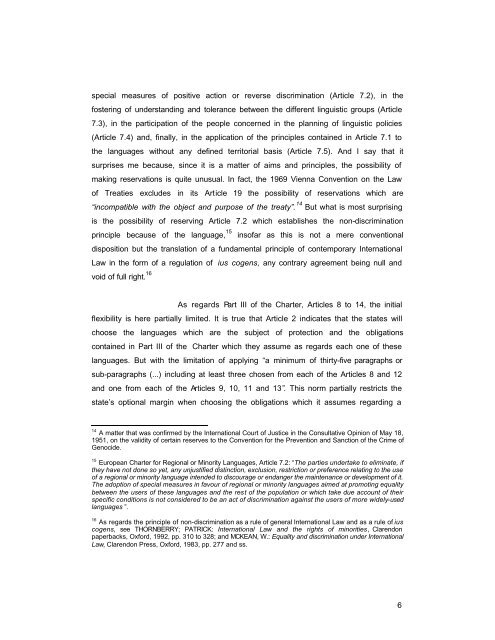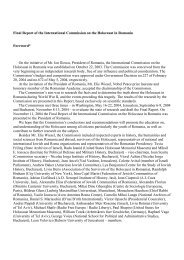get PDF document - MIRIS
get PDF document - MIRIS
get PDF document - MIRIS
Create successful ePaper yourself
Turn your PDF publications into a flip-book with our unique Google optimized e-Paper software.
special measures of positive action or reverse discrimination (Article 7.2), in the<br />
fostering of understanding and tolerance between the different linguistic groups (Article<br />
7.3), in the participation of the people concerned in the planning of linguistic policies<br />
(Article 7.4) and, finally, in the application of the principles contained in Article 7.1 to<br />
the languages without any defined territorial basis (Article 7.5). And I say that it<br />
surprises me because, since it is a matter of aims and principles, the possibility of<br />
making reservations is quite unusual. In fact, the 1969 Vienna Convention on the Law<br />
of Treaties excludes in its Article 19 the possibility of reservations which are<br />
“incompatible with the object and purpose of the treaty”. 14 But what is most surprising<br />
is the possibility of reserving Article 7.2 which establishes the non-discrimination<br />
principle because of the language, 15 insofar as this is not a mere conventional<br />
disposition but the translation of a fundamental principle of contemporary International<br />
Law in the form of a regulation of ius cogens, any contrary agreement being null and<br />
void of full right. 16<br />
As regards Part III of the Charter, Articles 8 to 14, the initial<br />
flexibility is here partially limited. It is true that Article 2 indicates that the states will<br />
choose the languages which are the subject of protection and the obligations<br />
contained in Part III of the Charter which they assume as regards each one of these<br />
languages. But with the limitation of applying “a minimum of thirty-five paragraphs or<br />
sub-paragraphs (...) including at least three chosen from each of the Articles 8 and 12<br />
and one from each of the Articles 9, 10, 11 and 13”. This norm partially restricts the<br />
state’s optional margin when choosing the obligations which it assumes regarding a<br />
14 A matter that was confirmed by the International Court of Justice in the Consultative Opinion of May 18,<br />
1951, on the validity of certain reserves to the Convention for the Prevention and Sanction of the Crime of<br />
Genocide.<br />
15 European Charter for Regional or Minority Languages, Article 7.2: “The parties undertake to eliminate, if<br />
they have not done so yet, any unjustified distinction, exclusion, restriction or preference relating to the use<br />
of a regional or minority language intended to discourage or endanger the maintenance or development of it.<br />
The adoption of special measures in favour of regional or minority languages aimed at promoting equality<br />
between the users of these languages and the rest of the population or which take due account of their<br />
specific conditions is not considered to be an act of discrimination against the users of more widely-used<br />
languages ”.<br />
16 As regards the principle of non-discrimination as a rule of general International Law and as a rule of ius<br />
cogens, see THORNBERRY; PATRICK: International Law and the rights of minorities, Clarendon<br />
paperbacks, Oxford, 1992, pp. 310 to 328; and MCKEAN, W.: Equality and discrimination under International<br />
Law, Clarendon Press, Oxford, 1983, pp. 277 and ss.<br />
6












